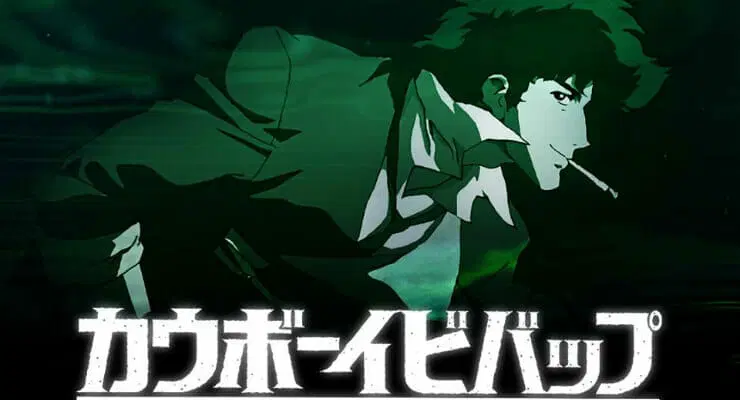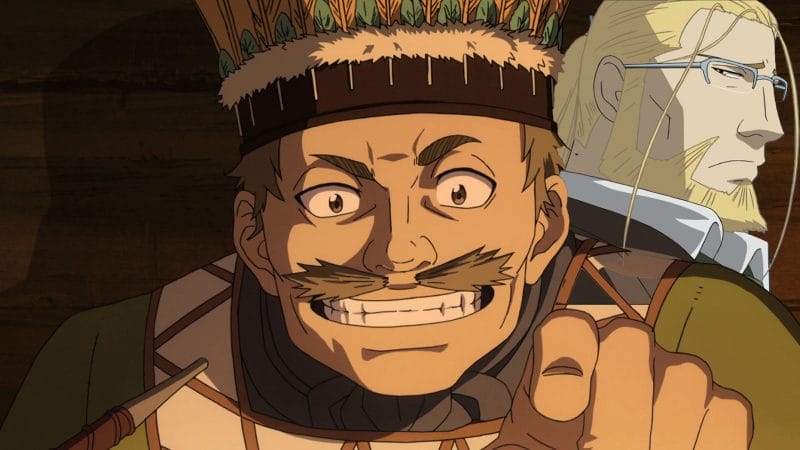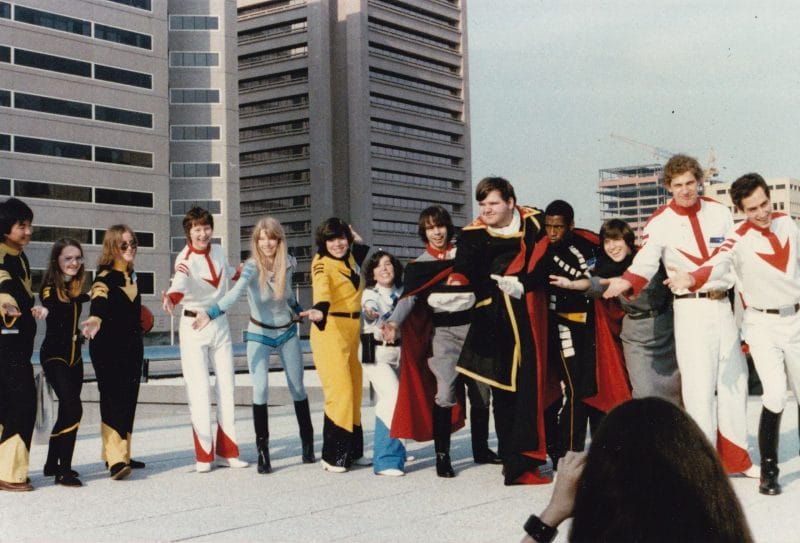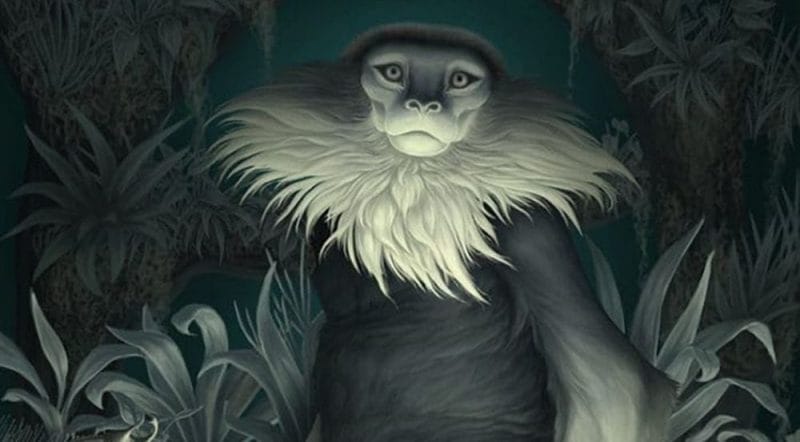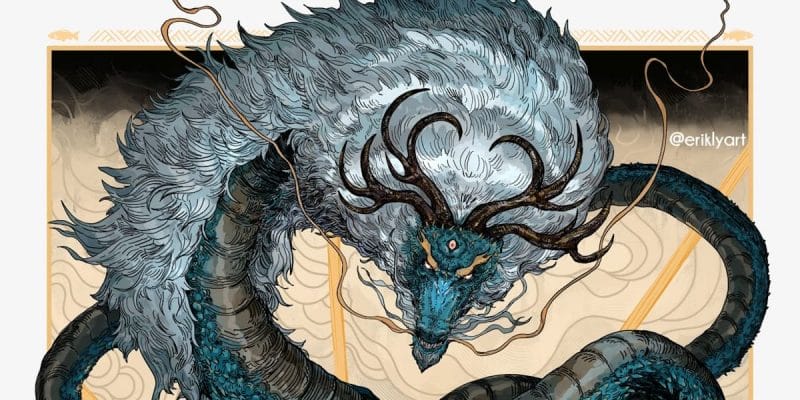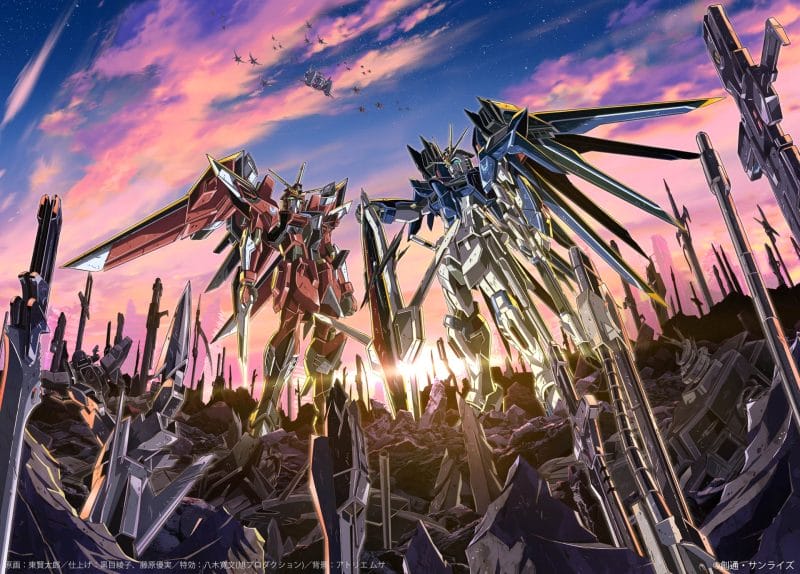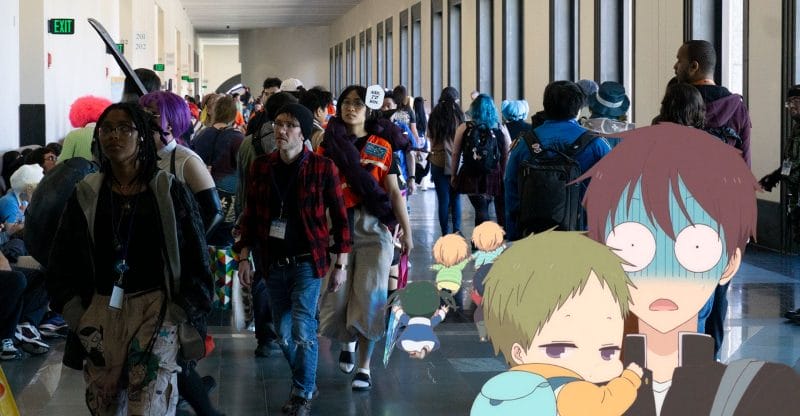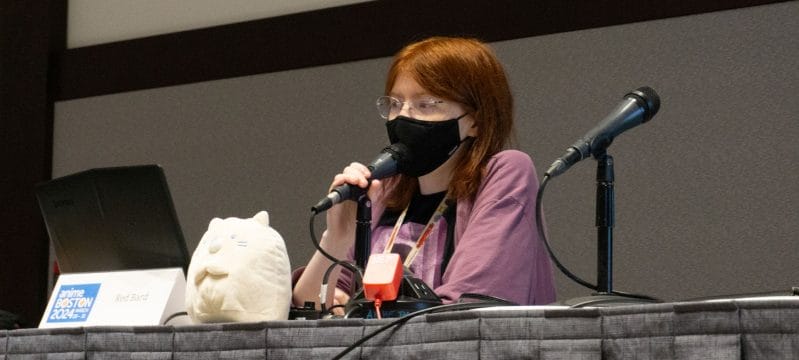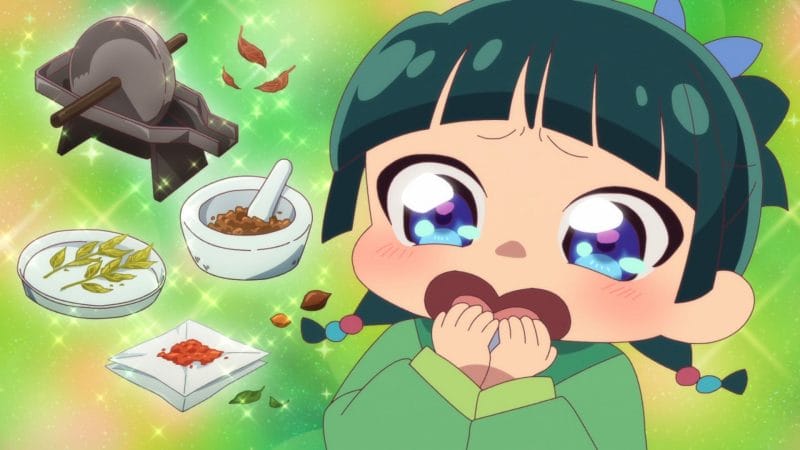Interview With Steve Blum
Location: Anime Boston 2018
Interview Date: 3/31/2018
In this day and age, it’s difficult to imagine a person who isn’t familiar with Steve Blum’s work. He’s a near-constant in the geek subcultures, with literally hundreds or roles under his belt, and a sound that is almost instantly recognizable. Some know him as Cowboy Bebop’s Spike Spiegel; others as friendly Toonami mascot T.O.M; others still as Wolverine, Starscream, and Vincent Valentine.
Having voiced so many iconic characters, though, the thought of sitting with Blum for an interview immediately becomes a daunting prospect. Those worries, though, quickly prove to be unfounded.
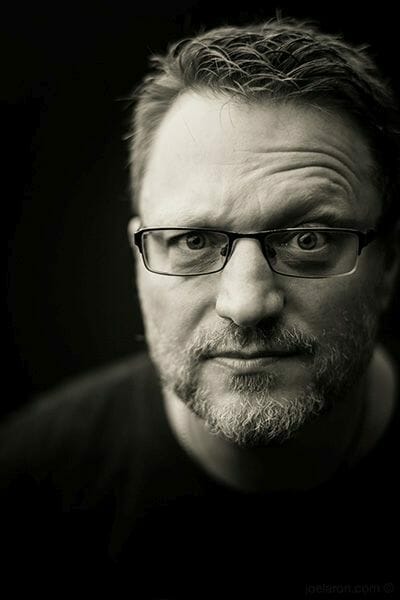
At Anime Boston, Blum sat with representatives from seven outlets, taking questions from an audience eager to know the man behind the mic. Within the first moments, it became apparent that Blum, himself, may be a bigger character than those he’s given life.
With a charming sense of humor and a refreshing candor, we found the conversation taking turns from Bebop, to voice acting, to fire extinguisher inspection and condom cleanup (yes, really). And, through it all, Blum was happy to share his stories and offer his insights. The conversation lasted just an hour, but it was clearly one that many in the room would remember for a lifetime.
Thanks much to Steve Blum for sitting with us, and to Anime Boston for setting everything up.
WSGU Center for Community Media: We’re big fans of your show Cowboy Bebop.
Steve Blum: I like it, too!
WSGU Center for Community Media: When you first started working on Cowboy Bebop, were you aware of how much of a success the show was going to be? And if not, how did people’s responses to the show defy your expectations?
Steve Blum: We had no idea! As with all the anime shows back in the day, we had no idea if anybody would see them. And it wasn’t terribly popular in Japan at the time, so we had the luxury on that show of just making it as good as we possibly could for us, because we thought was so awesome.
And we had a little more time for editing and stuff, so Mary Elizabeth McGlynn, the director was able to take a little more time, and do things more carefully than we would on other shows. And, so working in that vacuum, we did what we could, and then we walked away, and we didn’t think about it again until it was a year or two later. We started doing conventions, and seeing what the response was through America, and it became sort of a definitive piece that brought a lot of people into the fray that would not even consider watching dubbed anime up until that point.
And a lot of elements I think contributed to that. It’s just so beautifully constructed all the way through. The soundtrack is amazing, a lot of film noir references and pop culture references from the States. So it was a great gateway, I think, for a lot of people to get into anime. And the fact that people are still talking about it twenty years later is a testament to how good the show was! It, honestly, was our job just not to screw it up! (laughs)
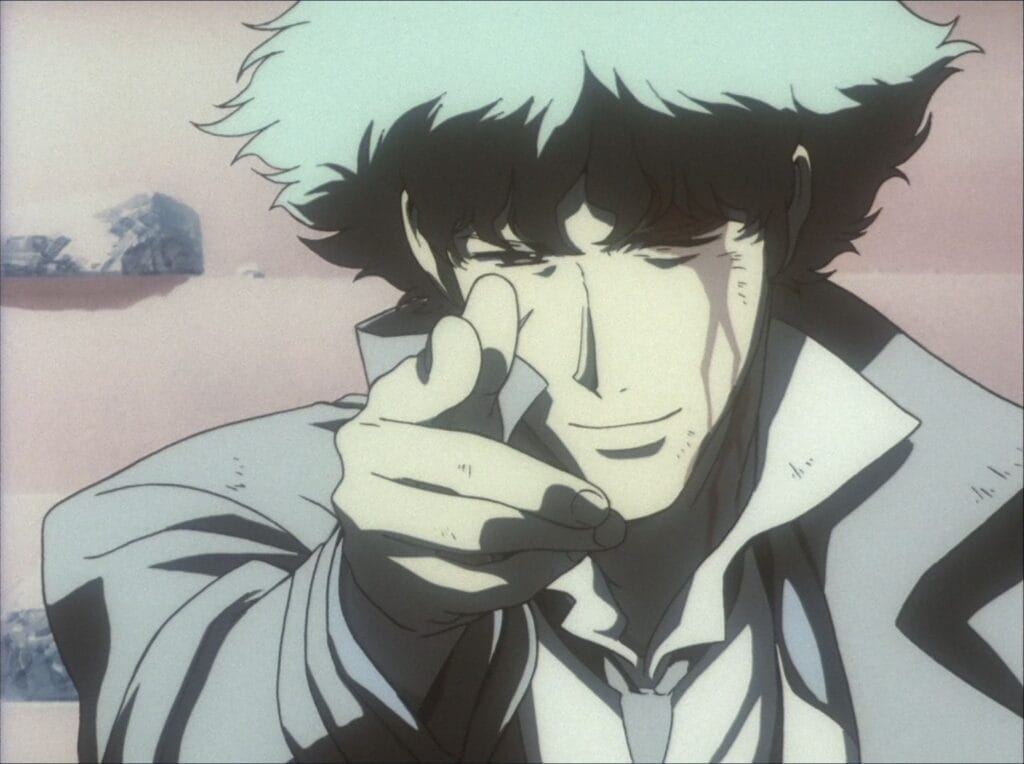
Samantha Ferreira (Anime Herald): As someone who’s been in this industry for more than twenty years at this point, how does it feel to know that your voice has been the voice of a generation, where people grew up with the roles that you played?
Steve Blum: It’s a lot of responsibility! (laughs) That was a really weird thing to hear in the beginning. You know, people saying that it was a voice from their childhood, and that sort of thing. And I take it very seriously, and I see the impact that these shows have on people’s lives. And that has become the motivation for me to continue working in this business, even more than the voice-over itself.
As much fun as it is – I love voice-over, I love doing it, it’s the best job I’ve ever had…. And I’ve had some terrible jobs. But the response from people, and the stories that I hear at conventions have changed my life on a cellular level. It’s the reason that I go to conventions. I really want to hear the stories, and it fills me up as a person. I feel like I’m doing something of value.
I was originally going to go into the sciences, and I wasn’t smart enough to do that! (laughs) So it’s a big surprise that this work has touched people, and I’m just grateful for it every day.
Brad (Camp Anime): What advice would you give to a young, aspiring voice actor or actress?
Steve Blum: That’s about a four-hour answer. I’m asked that question so often that I finally started teaching! (laughs) The biggest thing that I can give you in short form, here, would really be to do this because you love to do it, not to get rich or famous. And that if you do get to the audition process, the audition is the job. And if you’re thinking in terms of taking over a legendary character, somebody already has that job, so I would encourage new actors to try to find their own voice. And that’s what I do through my classes.
I just started teaching. In fact, I’m going to a little plug for my classes, here. It’s at blumvoxstudios.com. (laughs) And they’re live webinars that I’m doing every two weeks. And I kept the price really, really low for it, too. And one of the things that I’ve been telling people for years is “be careful who you take classes with.” If you’re starting out in voice-over, there are a lot of people who are very happy to take your money and are not necessarily working in the business. So I would say whether you go with me, or you go with anybody else, do your research.
Don’t pay too much in the beginning, also, because some of these voice classes cost thousands of dollars. This is twenty-seven bucks a month, and you get two classes a month. We’re gonna be lucky if we break even doing this, but I wanted to give a path for people who are getting into this industry where they won’t get taken advantage of. And we start out in our classes building self-confidence and helping people to bust through the stuff that has kept them from being creative, and to let go of all the voices that have been telling them they’re not good enough, or not smart enough, or not capable to do this work, because everybody has a voice.
And whether you do voice-over on a professional level or not, there’s always a way to do that and to practice that craft, and to learn that craft. I didn’t want to teach; I’ve been fighting it for ten years, but my staff has been bugging me, and the fans have been bugging me to do it. And it’s really hard to set up the curriculum to do this, but I want to do this right, and I want to help people to do it the right way.
The other thing I can tell you to do is, if they’re not ready for classes, we also have a free Facebook community, and it’s TheBlumvoxStudiosCommunity on Facebook. And they can sign up there for free, and I give free challenges every couple of weeks just to give them a taste of how to start out in voice-over.
And then Dee Bradley Baker has a website called “iwanttobeavoiceactor.com”. That’s also free, and there’s probably six months’ worth of work you can do right there, just to learn about voice-over. And Yuri Lowenthal and Tara Platt have a book called Voice-Over Voice Actor that’s reasonably priced, and has a ton of information in there, too.
So, there’s a lot of ways that you can do this the right way without getting hit by the predators in the business. It’s not a pleasant business, and you have to have some intestinal fortitude to consider it as a career. But, using the stuff that all of us are, in this group that I mentioned, practice and teach and live every day, you can avoid all that stuff and really do it for the love of it and for the fun of it.
And it’s a community. It’s a worldwide community too, where we all support each other, and also in my Facebook community group and in my classes, we have a zero-tolerance for bullying and for negativity. And anybody who has tried voice-over before in front of their friends knows that you’re gonna take some crap for it, especially if you’re in the beginning stages. And we don’t allow any of that stuff. We want everyone to be able to express themselves and be as big a dork as they possibly can, so all are welcome.
CJ Maffris (Toonami Faithful): I wanted to ask because there was a bit of news that was dropped before we were getting set for this interview about the new FLCL 3. And I’m curious how you feel that, not only you’re in another anime, that I’m sure a lot of Toonami fans are excited to see, but the fact that you get to share it with so many people again. Like another show. I’m curious how you feel of the whole process with working for FLCL and doing all that stuff.
Steve Blum: Well I love working on that for several reasons. First of all, it’s my buddies from Williams Street! When I went to record, they actually came to the recording session, and I didn’t know they were coming. And I only get to see them a couple of times a year. So just in terms of family, they’re family to me, so I was really excited to work there and work with Stephanie Sheh and Michael Sinterniklaas. I know the fanbase for this show is huge. I have a very small role in it. I don’t care about that, either. It’s fine.
I’m just happy to be part of it. I’m happy to do anything in anime to kind of keep my presence alive in the anime community. I love anime. I love working with people in anime. That’s what got me started in this business, and I’ll never forget that. And we’ll get to show it on Toonami, which is amazing, and there’s an extra bit of love that’s being put into it because the Toonami guys are a part of this, with the producers in Japan. So I’m excited all the way across! I’m looking forward, it may be actually one of the shows that I watch. I don’t even watch most of my own shows! (laughs) But now I’m gonna have to watch the original one again, too, and I’ve only seen bits of that. I’ve barely seen [Cowboy] Bebop, so…
And by the way, thank you, to Toonami Faithful for all the help you guys gave us, bringing Toonami back on the air! You were incredibly instrumental. During those years, we didn’t know if we were going to go back on the air. And we really appreciate the support that you guys gave us to do that, so we’ll never forget that here. You’re part of the family, too. Only Toonami! (laughs)
Evan Bourgault (Boston Bastard Brigade):I don’t know how much you pay attention to the music that you hear when you’re recording the anime, but have you ever been influenced by the music of, say, FLCL, or Cowboy Bebop, or even Great Teacher Onizuka?
Steve Blum: I haven’t seen Great Teacher Onizuka and I haven’t seen FLCL, so I don’t really know the music tracks. I’ve heard some of the music from FLCL, and I’ve seen little bits, but I haven’t seen it all the way through. So that’s not present in my life all the time, but Bebop certainly is.
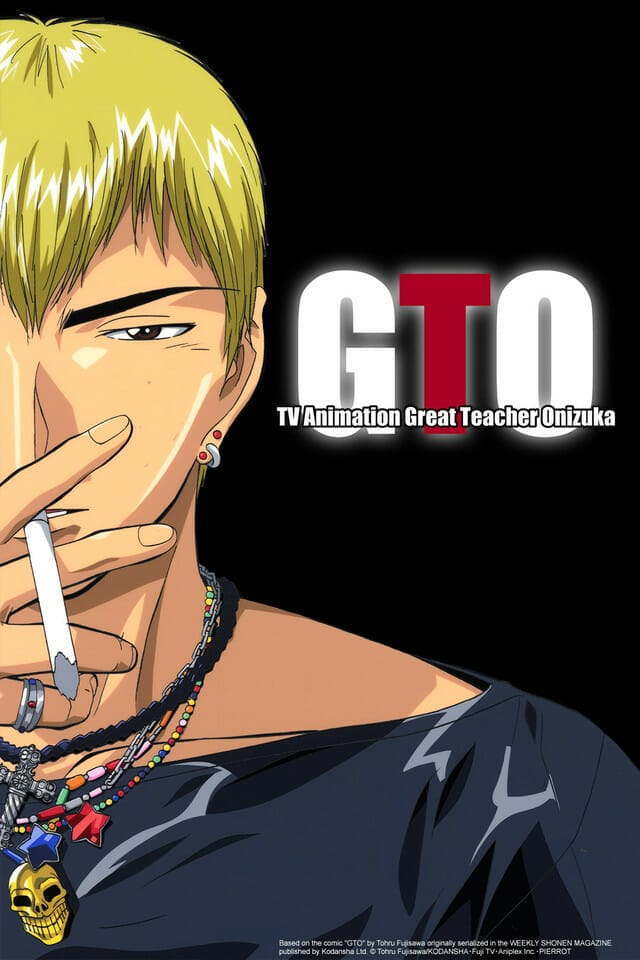
And the soundtrack was so amazing in that show, and we were fortunate enough in that show to get to listen to some of the music during the recording process. All of us are fans. I have the whole soundtrack from all of the episodes and the movie in my car. I listen to it all the time. I love that genre of music, Jazz and Blues, and all of the other crazy genres that Yoko Kanno sprinkled in throughout the series. It was so much great American music and music from all over the world, too!
That has certainly influenced, I think it influenced my performance in the show, because I felt like I, as cool as this character was, the way he looked and moved, I felt like I had to make him sound cool enough to be compatible with the music on the show, because it was so wickedly cool! And that was a big challenge for me, because I did not consider myself to be a cool person at all back in those days! (laughs) Those were really tough shoes to step into. I was super insecure through most of that, and just learning how to act at the time. So it was a terrifying process, but the music I found kind of soothing, and I listen to it all the time now.
Alexandra (Geekly Grind): As a veteran voice actor, how do you see the viewpoint on anime changing as it creeps into mainstream media?
Steve Blum: Well, I think anime’s been creeping into mainstream media for a while! I think [Quentin] Tarantino’s done that a little bit in his films, and certainly in the theatrical remakes of some of the most beloved anime series. Most of them are unfortunate, but (laughs) there have been a few really good ones, and I think it’s coming in more and more. And the crossover is kind of profound, now! I remember back in the early days that anime was really for the anime crowd, and you didn’t really see too many other people delving into that. And in recent years, you see such a huge anime presence, even at the pop culture cons and the gaming cons. Everything crosses over now.
I think it’s wonderful. I think’s amazing that people are getting exposed to it, and they can see the depth of the storytelling, and the intricacies of the familial structures in anime that doesn’t really exist in American animation until recently. I think they’re getting better at that, too. They take a lot more risks in anime, and so I that’s, I think influencing American animation now finally.
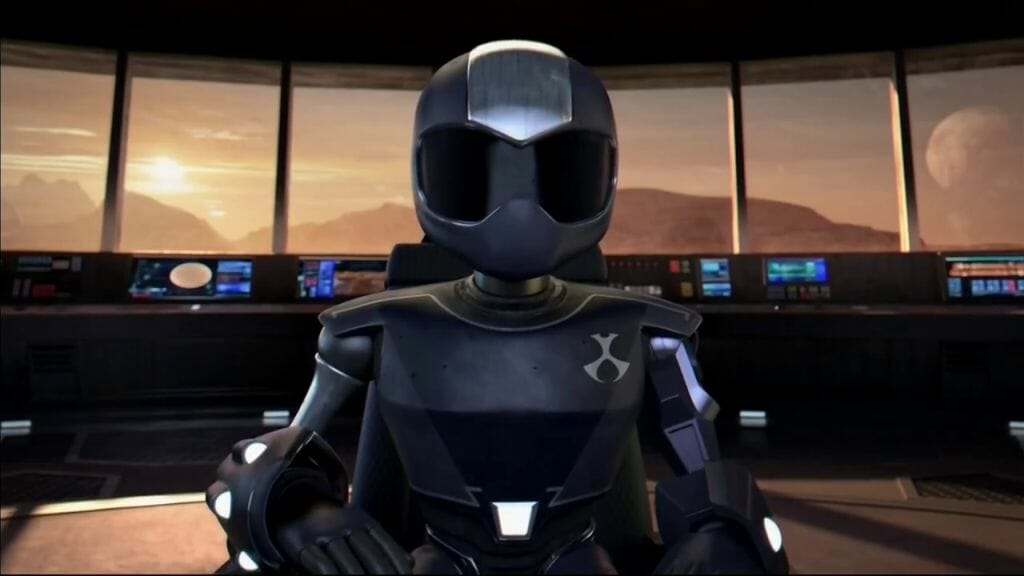
And also, it’s crossing over into other really unexpected genres for me. I don’t know if you know who Logic is, the hip-hop artist. But Logic came to me a few years ago, after his first album, and told me that he was a big anime fan and a gamer from way back, when he was living in Maryland, growing up in a really rough situation. And anime got him through some really hard times. To the point that he wanted me to participate on his next album, which was Incredible True Story. And he wrote a part for me that was loosely based on some anime characters, a little bit on TOM. from Toonami, and just stuff that he loves as an anime fan.
And when he was about ready to release Incredible True Story, we did a convention appearance at New York Comic Con. And Bobby put together a panel there. And he wanted to see who would show up. We were really curious to see what that demographic would be. And it was so funny! It was sort of like those old peanut butter and chocolate commercials where the two shall never meet, but when they do it’s an awesome thing. And you see hardcore hip-hop fans on one side of the room, and anime fans on the other side of the room.
And all of a sudden they start having these conversations! And the hip-hop guys are going “I’ve loved anime for my whole life, but I couldn’t tell any of my friends!” (laughs) And the anime guys were saying “I’ve been bumpin’ in my car for years, but I can’t tell my mom or any of my buddies!”
So, to see this kind of crossover, it’s profound, and it’s deep, and it’s global. It’s amazing. Going to Logic’s concerts, too, and seeing the audience, and you see some people with cosplay references, and nerdy T-shirts! It’s amazing! We play D&D (Dungeons & Dragons) together, so it’s, all these things are sort of intertwining together, now, and it’s wonderful! I feel like, especially, in these times, when there’s so much intentional separation by people in power, that there are people like Logic, and people like us in our community who are interested in bringing everybody together and finding the commonality.
And I love that! I really, really love that. And so, thank you to Toonami and everybody else who really started bringing this out to America!
Andrew Fleming (Wicked Anime): What was the absolute worst job you’ve ever had before entering the anime industry?
Steve Blum: Oh, man! I’ve had some stinkers! I don’t know if I can find which one was the worst. I’ve had some pretty bad ones!
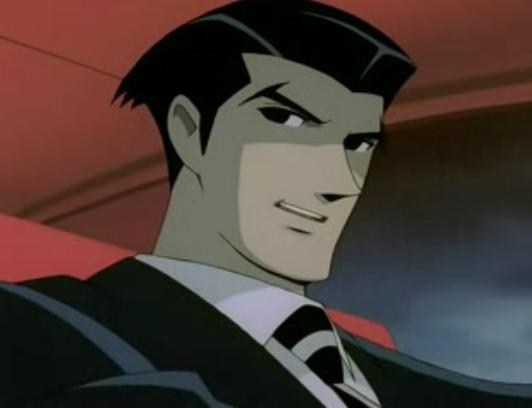
One of them was, well, the job itself wasn’t so bad, but I used to be in Fire Protection. I got a job for a few years, I don’t know why. I was working at a pet store, I think, or a Pep Boys, I had a lot of weird jobs. And one of the customers came in and asked me if I wanted to work with him as an independent contractor. I could make my own hours. I thought it was a great idea.
The first day on the job after my training, I was working in downtown Los Angeles, and it was my job to refill fire extinguishers. Inspect them and refill them. And so, one of the things I had to do before they had the fancy equipment for it now was, I had to squirt it out into this canvas bag. Weigh it, clean it, and then pour it back in. And I’m pouring this powder into a fire extinguisher through a funnel. And this homeless guy came up to me and started talking to me. I love talking to homeless people, because the stories are fascinating. I really like to engage and look them in the eye, because a lot of people don’t. And, so, I’m having this conversation with this guy, and he’s a really intelligent man, and I don’t remember what his story was. But he’s right in the middle of a sentence, and he throws up all over my shoes! (laughs)
And I was thinking “Wow, okay! So this is how this job is going to be! This is great! Awesome!”
The other awful job that I had, I was working at a film studio called Empire Entertainment, and it was the company that made Re-Animator, and Ghoulies, and the Trancers movies, eventually the Puppet Master movies… and I was working as a runner and a mailroom clerk. I was the low man on the totem pole. This was just before I got into voice-over, I actually got my first voice-over job through that gig.
But one of my first jobs at that company was to de-skunk the boss’s dogs. And I had this truck! I had a little pickup truck with a carpet kit, and in those days it was shag carpet. And he had two Great Danes, and they had just been skunked, and I had to force these giant animals into the back of my truck. And I had to drive them thirty-five or forty miles because of course, he had to pick the most expensive, farthest vet that anybody could find. And that smell would not come out of my truck for about six months, and I had to use that to make deliveries every day. So that was terrible.
And then, the other thing that I had to do as the low man on the totem pole was condom pick-up in the morning. (chuckles) Because we worked in Hollywood, we were right near Hollywood and La Brea, and in the back of the building is where the ladies of the night would do their business. And the parking lot would just be strewn with this detritus. In the morning, the low guy on the totem pole had to go around and pick up all the stuff, so yeah. So, that was one of many awful, awful, awful jobs that I had. And even when I was working as a professional voice actor, I had three other jobs to support that, and they weren’t any better, necessarily.
Great question! (laughs, the room joins in) I paid my dues!
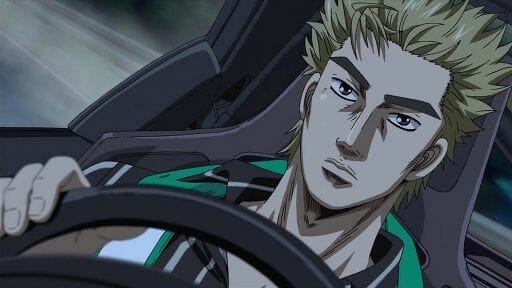
WSGU Center for Community Media: You starred in the anime Rurouni Kenshin, which is one of my favorites. The Rurouni Kenshin antagonist Shishio Makoto, had a distinct ideology revolving power dynamics. “In this world, the weak are the servants of the strong. The strong live, the weak die.” How did you prepare to get into the mindset of the character?
Steve Blum: I didn’t have any time to prepare! Like most anime, I walked into the room, they showed me a script, and they said “Go.”
And that was it. I didn’t get to read through it, I maybe got to see the scene once before I recorded, so there was absolutely no context for me. The only reason I sort of have a recollection of those lines is because people will ask me to sign that at autograph things, here.
I’ve never seen the show. Virtually my only memory of that show was screaming. I just remember a lot of pain towards the end. So, when I do embody a character that has a philosophy like that, I just have to put myself in their position, that they really believe that. However awful their philosophy may be, they truly believe that that is the right thing to do. And that helps me to get through it, and I just, I live in that for a little while, then I step right out of those shoes and I go back to being a decent human being again. But it’s kinda fun! It’s fun to be the bad guy. It’s fun to slaughter stuff, and do it in a safe environment, where nobody really gets hurt, and it’s a great release of anxiety and tension and the buildup that goes on. Especially in those days, I had to drive a lot. I didn’t live close to the studio, and traffic in Los Angeles is awful, so by the time I got to there I was plenty angry, and it worked really well for the character.
But in terms of preparation, there is none. Absolutely zero context and zero preparation, unless the director chooses to give us some.
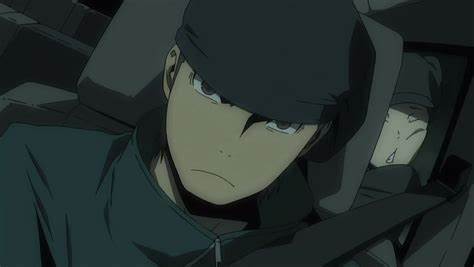
Samantha Ferreira (Anime Herald): Despite having over five hundred roles under your belt, is there a part that feels like, say, the one that got away?
Steve Blum: I don’t think in terms of the ones that got away. And that’s one of the things that I advise to my students, too, is that, I’m so grateful for all of the characters that I’ve had the opportunity to play to this point, because I never thought I would do this for a living. So, every time I’ve booked a role on a character that became iconic, or had some special meaning to me, first I say a prayer of thanks.
And then, secondly, I sort of have this monkey on my shoulder that says “you shouldn’t have been doing this, and they’re gonna figure out that you don’t know what you’re doing pretty soon, and they’re gonna recast.”
So I don’t really think about the ones that got away. The only exception I might say to that is that early on in my career, because of my natural voice print, I thought I might be good for roles like Batman, for example. And then, I hear Kevin Conroy’s version of it. I went “Oh… no! He’s my Batman! I’m good!”
And the great thing about this industry is that even if you’re jonesing after some role that got away, chances are that if you stay in it long enough, you’ll get a chance to play that character in some incarnation, anyway. So I have played Batman a couple of times! Once was for a thing that we did for submarine crews for the military. It was a lost episode from the old Batman series. And so I got to play Batman, and that was really fun. I don’t know if anybody ever heard it, I don’t know if it was even approved. But I didn’t care because I got to pay with a bunch of other voice actors, and be Batman!
And I was the original Lego Batman, who was nonverbal. And through the whole game, I was “Hmm! Hah! Hoo! Hmm!” However, I got to go to Toys ‘R’ Us, sorry, Toys ‘R’ Us, and buy the little Lego Batman figure so I could put it up on my shelf with all my other stuff, and that’s all I really cared about! (laughs)
So, yeah. The only other thing I would say about the jobs that I haven’t been able to book is I’d love to do some more Disney/Pixar kind of stuff. Some of the big movies. Because those roles are so well defined. They really dig into those characters, and it feels like you’re living a life from beginning to end. I do have that experience in shows like Star Wars: Rebels, where we create a character and we really see it through for several seasons. So that fantasy has sort of been fulfilled, but just because I grew up as a Disney kid, I’d love to work on some of those big movies and really get a chance to play. Where I know that every nuance that I give them vocally is going to be animated, and that’s not always the case.
Brad (Camp Anime): Could you tell me about the environment that you’re in during a recording session for one of your roles?
Steve Blum: Well, every studio’s different! I’ve been in studios that are awful. I’ve recorded Toonami in my car at four o’clock in the morning from Australia. And then I’ve been in these glorious, gigantic, beautiful studios recording things like Rogue One [A Star Wars Story] with their legendary places. Every studio’s a different experience, and every genre’s a different experience, too.
For anime, it’s usually a smaller studio, one microphone. The director, maybe the producer and a writer are behind the glass on the other side. And it’s a very controlled environment with the monitor, where there’s a lot of concentration on trying to hit all the beats as we’re watching the screen.
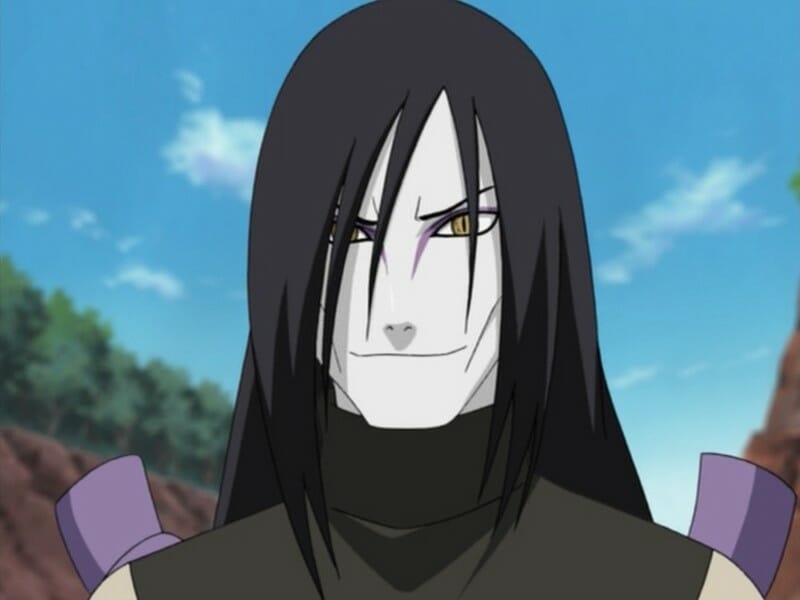
Something like video games, they’re usually done where I’m in the room by myself, but we have a lot more material to get through. So they’ll just hand me a stack of paper, and say “Alright, we’ve gotta get a thousand lines done in the next four hours. Go!” And we just try to crank through as fast as we can. Like, on Mass Effect, the stack was that thick (gestures with hands). And to stay in character, and to stay focused, and listen to everything my director says, it’s a great exercise in concentration and focus, and behaving myself (laughs).
When it comes to working in a cast situation, like Star Wars: Rebels or Transformers Prime, or Wolverine and the X-Men, it’s like a radio play. And it becomes the challenge for the director to keep us all focused. Because when you get a bunch of voice actors in the room, most have come from a comedy background or musical theater or TV or film. And they’re a bunch of eight-year-olds in old people suits! We’re kindergartners! We’re idiots in that room! We’re trying to crack each other up constantly, and we’ve got work to do, so it’s really tough to keep everybody wrangled and focused, but it’s the most fun you’ll ever have as a voice actor! Because you get that energy playing off of the other actors, too, and the director also. So, it’s different!
It’s just different in every circumstance. And levels of comfortability vary, too. First episode I recorded for Star Wars: Rebels, I was in England doing a Transformers convention. I went to somebody’s private home, and recorded that in this guy’s teeny tiny booth with no air conditioning. Just pouring sweat, and everybody’s on the phone on the other side in America, giving me directions! Two weeks later, I’m in this beautiful recording studio with everybody from LucasFilm on the other side of the glass, and it’s the same show! So, they’re all completely different. But the work itself is the same. The acting is the same, and the level of focus that you need when you’re up at that microphone and you have to embody that character. That remains the same wherever you go, or it should. And it doesn’t matter what the part is, either! Even if a character has a 30-second lifespan, you have to be just as focused for that character as you would for an iconic character who’s going to go through 26 episodes.
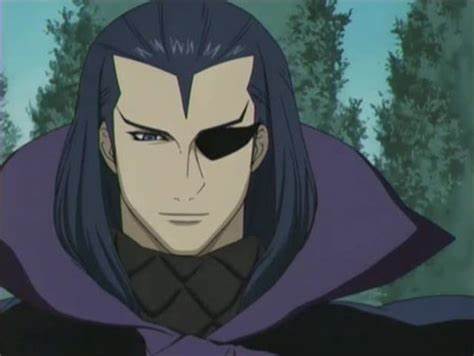
CJ Maffris (Toonami Faithful): For events such as Intruder 4, or any type of emergent content that happen at Toonami, what’s it like recording for Toonami and Adult Swim? Do you just show up there? Do you do it at home? What’s a day in the life of recording for TOM?
Steve Blum: TOM, I record from home. I have two studios, and usually I record from my little one which is just a converted closet. So, if you think your guys’ studio’s ghetto, this is pretty ghetto! (laughs) But it’s good equipment, and they send me the scripts. And nowadays, I’ve been working with those guys long enough that they’ll send me a script. And most of the time, it’s not even supervised.
Before, I do have a voice patch, and we would contact each other through the phone, and I’d hear them through my headphones and they would direct me through the lines. For Intruder, I think they still did it that way. When we got to Countdown, I think I just recorded those on my own, and then we made some tweaks down the road. But I’ve only recorded at Adult Swim a couple of times, and it was just because I happened to be there visiting. But 90% of that is recorded from my home studio. And then, last night, I actually had to pick up from my hotel room! I have the little USB mic and I plugged that in. And I was building a little pillow fort, and threw the comforter over my head, and got right down in there, and tried to get out all the noise and people slamming doors out there, and matching what I had done before so they could slot it in. But it’s guerrilla style! We get it done however we need to get it done now! It’s not glamorous, necessarily. (laughs)
But working at home, I can work without pants if I want to! You guys wouldn’t know! (laughs)
Evan Bourgault (Boston Bastard Brigade): Every time you come up with a new role, do you prefer to be the first voice, the first unique voice of a character when it’s introduced, or do you prefer to either adapt a new role, or be the first English dub to a voice of a character. And what are some of the challenges between the two? Like, how are some of those significantly different?
Steve Blum: That’s a great question! I think, overall, I prefer to do a new take on a character, initiating a character. I prefer that, I prefer creating something from scratch, because then we actually get to define it from the very beginning. And to me, that’s a little bit more creative than trying to adapt or stay away from somebody else’s performance, or embody somebody else’s performance. I’m not an impressionist, so I hate copying somebody else’s performance. That really bugs me. There are people who love to do it, and they’re really, really good at doing it. But, that said, there’s a pretty great degree of satisfaction that comes with bringing a new take to a character that’s beloved, and having people accept it.
I was terrified to step into the heels of Starscream, just because of what Chris Lotta had done before, and so many other people had done before with that character. I remember at the final readings for that, before we started recording, I was thinking “Oh, man! If I screw this up, people are gonna hate me! I’m gonna get death threats!” Because I know how devoted that fanbase is! And I still wasn’t sure. Even after years following the recording and release of Transformers Prime, I still felt like “there’s gotta be some haters out there. Maybe I just haven’t heard from them, but I know it’s coming!”
And I was doing a live podcast with Rob Paulsen at the improv in Los Angeles, it’s called Talkin’ Tunes. And before we went up onstage, the lady who was producing that show came up to me and she said “Oh, I’m Chris Lotta’s daughter, and I just wanted to say he would’ve been proud with what you did with Starscream.” And I went (comedic wail)! I’m okay with it now! It’s cool! But just being an insecure actor like most of us are, I worry about that! I care very deeply about how these characters are perceived by the fans.
And I always have that in the back of my head. I always have the end user in the back of my head when I’m doing any kind of role. And Wolverine is another great example, just because he had been done so beautifully by so many people in the past! And stepping into those shoes, and doing that character that I loved so much, and I was a fan of Wolverine, also! Was a terrifying thing. But the executive producer, I think he was at the time? He came up to me and he said “Yours is the voice I’ve had in my head when I used to read the comics!” And I went “oh my God, that’s amazing!”
I’m an organic actor, and I like to, in my original audition for a new character, I just go from the gut. I don’t try to copy anything, I don’t try to be anything other than what my gut tells me, and what the voice is in my head when I’m reading the comics. And if somebody agrees with me on the other side, great! If not, I’m not going to alter it so much that I’m not being true to the character. And if I have to go that far, chances are it should be someone else’s role anyway!
But then, playing a character like Zeb in Star Wars, introducing a new character into the Star Wars universe that’s based on a Ralph McCory design for the original Wookiee… when I found out that that’s what that a character was, all of a sudden, this overwhelming sense of pressure and obligation came into the back of my mind that I can’t screw this up! This has got to be fun and it’s gotta be good, and gotta be something that’ll be lasting as a fan of Star Wars. And I just prayed that that’s what we delivered. And I trusted everybody at LucasFilm, and they were so great. We went through a lot of different interpretations of Zeb before we landed on that one. And when I saw that people in the room would laugh at certain things that I was doing with him, I thought “okay, this is going to work.” If these guys will laugh, they’re the most seasoned pros in the world in the Star Wars Universe, and they can be pretty cynical. And if I can get their attention and have them laugh, then I think that it’s gonna translate pretty well out there.
So it always starts for me, first from an organic place, and secondarily from how I feel the fans are going to perceive it. And everything else is just gravy! And then I just try to not screw up the writers’ words, too! I try to honor that as best I can.
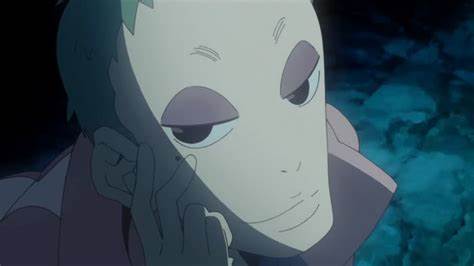
Alexandra (Geekly Grind): What do you find are the major differences in working on anime versus western animation?
Steve Blum: The biggest difference, really, is that anime is putting an American spin on something that’s already existing. So, it’s my job just to match the lip flaps, make it look natural, like it was written that way. And there’s that technical aspect. It’s like a juggling act. Because I’m listening to the director and reading script and watching the screen all at the same time. And trying to maintain that character’s integrity through that, it’s an interesting skill set to do that.
In American animation, we have the luxury of creating characters from scratch, in many cases. And so, we’re lifting stuff off the page, and we’re giving our unique spin to it that the writers and producers may not have thought of. And we get to sometimes ad-lib, so we’re creating a little bit of nuance for the character that may not have existed prior to when we walked in. In anime, we are bound, somewhat, by what has come before us. We have to make it work with the picture.
And I always try to screw around with that a little bit anyway, though. I try to change up the phrasing, I try to put in little nuances that weren’t necessarily in the original Japanese just to give my take on it. But underneath all of that is acting. And a lot of people who are getting into the business for the first time think of voice-over, voice acting as doing voices. Well, the acting part really has to come first. So that’s what’s present in both of those things, and that’s a constant. Same techniques under that, different juggling act.
Andrew Fleming (Wicked Anime): What do you think is the sexiest character you’ve ever played?
Steve Blum: Ah, Leeron from Gurren Lagann! (chuckles, starts imitating) When you screw it in, give it a hard, manly twist! He was just not afraid that way! (resumes his normal tone) It’s hard to say sexy from my perspective, because I’m the one who’s putting it out there. You guys are the ones who are consuming this stuff, so… I think everything’s sexy in its own disgusting way!
There are creatures I’ve played in, like, the Blizzard games that are disgusting, drippy, horrible things that tear people apart. And, in the sessions, I make ‘em sexy! (chuckles) And the outtakes are hideous! They’re just disgusting, they would probably make a lot of you throw up. But, to me, that’s funny. I just think that “sexy” is a ridiculous thing. Everybody has their own interpretation of what sexy is!
Andrew Fleming (Wicked Anime): So can we all agree it’s Spike Spiegel?
Steve Blum: Yeah… but the funny thing with Spike is that he’s so apathetic! Being a woman on the other side of Spike’s relationship would be a difficult thing!

I mean, the guy doesn’t really care if he lives or dies! He’s not even sure if he’s awake or dreaming. That would be tough to hold a solid relationship, being like that. But fortunately, Mary Elizabeth [McGlynn] disagreed. So, Mary Elizabeth McGlynn, for those of you who don’t know, was the director of that show, and she played Julia on that show, my love interest. And now, she’s my fiance in real life, twenty years later. So, I hope that she still finds that sexy, because that’s my normal speaking voice, and that’s all she’s got! (laughs)
Andrew Fleming (Wicked Anime): We’ll ask her next! (laughs)
Steve Blum: Good, good! (laughs) You know who else I thought was pretty sexy, though, was Vincent Valentine from Final Fantasy. I just thought the animation, the way he moved was really cool. Also probably a terrible life partner, but I love the way he spoke. It was just very quiet and whispered and… I wouldn’t mind hearing that in my ear! That’d be comforting. (laughs)
WSGU Center for Community Media: Your last appearance at Anime Boston was, as a guest, in 2006. Why did you choose to attend the convention again this year?
Steve Blum: Because they asked me! (laughs) I love Boston! And I go to conventions that want me there. I don’t solicit myself to conventions, for the most part. And I don’t know if they’ve asked before, and if I haven’t come before this, it’s only because of a conflict. I’m busy, I’m doing twenty-five to thirty conventions a year, and hopefully working, and now doing my teaching stuff, too. So, it’s usually just a matter of scheduling. But I’m really happy to be back here. I had a lobster roll today, it was so good! (laughs) Thanks for having me back!
Audrey (Camp Anime): So, to come back from that, in a short version, how did you begin your career as a voice actor? I know you touched on that a little bit earlier with your odd jobs. How did that conversation go?
Steve Blum: Well, I didn’t intend to become a voice actor. I didn’t even know that that was a viable career. I just did it for fun, and my first gig was working at that same film company, Mr. Condom Pick-Up Boy. In the mail room, I was the only non-actor. I was in a band. I was playing in an R&B band opening for heavy metal acts and hair bands during the ‘80s, so it wasn’t going great.
But I thought that’s what I really wanted to do, and this was a great day job, because it allowed me flexibility. And one of my buddies, this guy named Vic Garcia, was the head of the mail room, and was casting this Japanimation program called The Guyver. And he just needed voices for it, and it was one of the early shows In America to be dubbed.
And we all screwed around with voices in the mail room. Tom Fahn was another guy in the mail room who’s a voice actor. He’s been on a ton of stuff. Famous for Digimon and a bunch of other things. And Tom and I would greet each other in the parking lot as old men! We’d come back from runs, we’d be doing deliveries. And we’d see each other across the parking lot, and we’d hitch our pants up to our stomachs and hunch over and (imitates an old man) “Hello, how are ya, how was yah run? What’s your name again? I forgot who you are” and we’d just go through this whole routine. And Vic saw us doing that, and he goes “you do voices?” And I said “No, I’m just screwing around!” And he goes “Well, I need a deep voice and you have the deepest voice in the mail room! Would you come to the studio on the weekend, and I’ll give you free breakfast and lunch?”
And all I heard was “blah blah blah blah blah Free breakfast and lunch. Free food.” And I was a starving musician at the time! And he said “All your buddies are gonna be there. You’ll know a bunch of people there, and it’s gonna really fun. All I need you to do is, like, scream like a monster and we’ll see what happens. And if they like you, they’ll $7 a line and you still get the free food!” And so I thought “OK, well, how bad can this be?” I told him I have no acting ability, and he goes “(scoffs) Neither do most people, even if they think they do! But come to the studio anyway.”
So we go to this studio called “The Cave,” and it was a tree house. The studio was in a tree house, and the back of the studio was butted up against a dirt wall that they had dug a cave out of. So it was truly a cave and a tree house all in one. Terrible for sound! We actually had to haul the equipment up in the morning, because they had to rent it. They didn’t even know what they were doing.They didn’t know how to lock picture to the audio. It was all brand new to everybody in LA! People just weren’t doing it except for Streamline and a couple of other companies at the time.
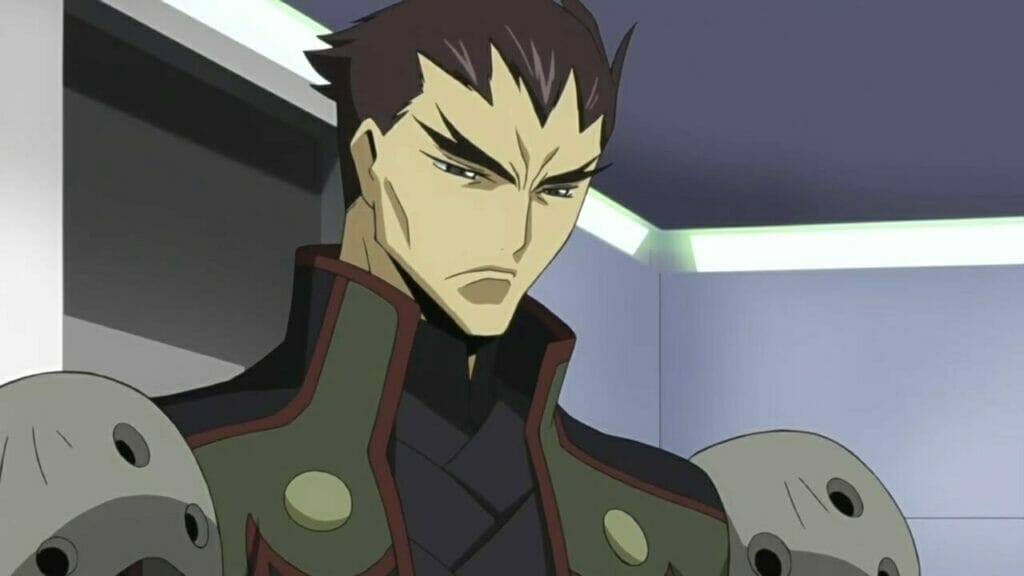
So I thought “Okay, that’s fun. I know how to move stuff, that’s what I do for a living!” So I’m hauling this equipment up there. I’m eating pizza and whatever else they would feed me. And they and me step up to the microphone when it was my turn. And before I did, I had the advantage of watching all of these other people auditioning. And there were some really good actors! A lot of really good anime actors who are still working now in the industry. And I got to watch what they did, and I just copied it! I just figured “Alright, well I can do that! All I have to do is match the movements of the lips and the body, and I can do that! I think I can do that!” Because of my musical training, it made sense to me. It’s all rhythmic.
So I stepped up to the microphone, and he wanted me to try out for a creature called a Zoanoid, which was this horrible drippy monster kind of thing. And my first audition was to pretend like I was ripping the arm off another Zoanoid and beating him with it. And he said “Okay, what would that sound like?” And I went “Oh! Got it! Easy!” And he goes “What?” And I said “Yeah, sure, got it!”
And so I’m looking at the screen, and I just go “(lets out a guttural, monstrous snarl)” And it matched! Perfectly! First time! And everybody in the room went “Oh! Okay, cool! Yeah! You’re hired!” (chuckles) “Can you work for the rest of the day? And here’s the schedule we’re gonna be working on, and we’re gonna need you to come back and do this, like, every week!”
I went “What?! Now I have to work? I have to learn how to do this? No!” I just wanted more pizza! But I got my $7 a line, and then they started giving me English-speaking lines. And the terror started to set in because I had no acting training. But I just copied what everybody else was doing, and I tried to make it as natural for the character onscreen as I possibly could. And it just made sense! It was just a natural thing for me to do. And, fortunately, the lines were short, so I didn’t have to do big soliloquies. I didn’t have to do real deep emotional acting. It was just big monsters or very quiet, soft-spoken bad guys. And so that was an easy thing for me to do.
I had to learn how to act on the job when I got to Cowboy Bebop. That’s when I really had to start developing acting skills. But in the beginning, it was really just a natural, fun thing that I did on the weekends with my buddies, and made a little bit of money at it. A little bit of extra pocket change. And somehow, I just kept doing it for all those years. And I stayed at that film company for almost fifteen years. I kept moving up in the company. Didn’t want to, but I did. I ended up as the head of marketing. I was an executive, with this beautiful office in Hollywood. And I hated going to work every day, because people in the film business are so mean. But on the weekends, I would still get to do anime, and everybody was so sweet in that community. They’re all my friends today, and that’s one of the main reasons I stayed with it as long as I did.
And I guess I got competent enough at the voice acting thing where I was able to get an agent, and start working professionally in the industry. But I didn’t start doing this full-time until I was 40 years old and quit my other job.
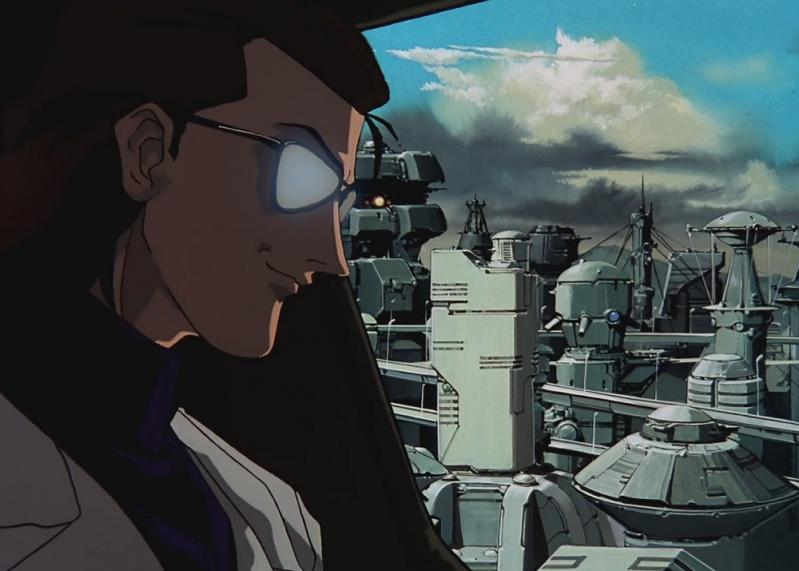
CJ Maffris (Toonami Faithful): Since you voice TOM, how much have you enjoyed the progression of Toonami from back when it was on Cartoon Network to now, and how fans seem to really be really progressing and even more fanfare now, it seems.
Steve Blum: Yeah, Toonami’s been a long, amazing, wonderful ride. I feel like I kind of grew up in the Toonami family! It’s certainly brought more acceptance to dubbed anime to the United States. When I first started in the business, when I was doing shows like The Guyver and those early shows, people hated that we were dubbing anything. And I actually had my life threatened. I didn’t go to cons. After the first con, I stopped for a while, because my life was threatened at a con for “destroying the art form of anime.”
So fans have grown up through the years with Toonami, and I feel like we’ve given a lot of great content. And we’ve really helped a lot of people, I think, with the inspirational pieces. That’s our favorite part to do, of all of Toonami to this day. We love doing inspirational pieces. And people come up to me at conventions all the time, and they say that it’s gotten them through some really rough times.
I feel like Toonami’s just grown up! It’s had this natural evolution, and the pieces like Intruder and Countdown are just getting more and more awesome. I wanna do a movie or a series with TOM and Sara! I think it would be amazing to get the Clydes back in, and it’s so ripe with content and history now that we could do justice to it I think at this point.
But I love the fanbase, too. The fans are the best thing about Toonami. And all ages, too! That’s the most astonishing thing to me, is that I come to conventions sometimes, and I’ll see grandparents who are watching Toonami with their grandchildren, and introducing them to anime that they watched when they were younger. And people telling me that they got in trouble. When they should’ve been doing their homework, that they ran home and they watched Toonami in the afternoons. And I always tell them to apologize to their parents on my behalf, but it looks like they made it through okay!
And now, people are still staying up late. In this current time, when most people are giving up their cable and watching everything streaming, I’m really grateful that people are still tuning in! It’s nice. I love that format, and I hope it stays there for a while. And we put a lot of love into it. I think the thing that’s really given Toonami its longevity more than anything else is the love for this art form by the people who are creating the content. And Jason and Gil and everybody at Toonami are big fans of anime, and big fans of the music, and big fans of sci-fi and all of the different things they talk about on their show, too. On Pre-Flight.
It’s honest. The love for this is honest and all of us put every bit that we can into it. We all love it a lot, and we’re grateful.
Evan Bourgault (Boston Bastard Brigade): Which role of yours would you say you’ve had to dive the deepest to pull out your performance?
Steve Blum: I think the hardest one for me, initially, was Spike. In the beginning, because it was one of the few characters where I used my own speaking voice. And it was ironically the hardest thing for me to act whilst using that voice. If I’m embodying another character, I feel like I can jump into that and I can do anything. I can get out of my body, and all of the self-conscious stuff goes away. But when I’m speaking with my own natural voice, that’s when all of my stuff comes up. And so, for the first five or six episodes of that show, recording, I was terrified! I felt like I was being thrust into a leading role which, it was my first real leading role. To carry a show for all of those episodes, and as this cool, amazing character that I had a hard time connecting with because I didn’t see myself that way.
So that was the initial barrier to it. And then, eventually, when we did the Cowboy Bebop movie. And I don’t know if you remember that, but there was a scene where Spike was in a jail cell opposite Electra. And they’re talking about their pain, and their lost love. And I never had to do that in a cartoon before. And, not having any acting training, I didn’t know how to access that. I didn’t know how to be vulnerable. And Mary Elizabeth was the director there, and she had to break me down, pretty much, and get me to a place where I thought about my own pain. And I felt like I was naked and vulnerable in that moment for the first time as an actor.
And it transformed me, as a person and as an actor. I felt like it was incredibly important to let myself become vulnerable. I had spent my whole life avoiding that in my personal life and professional life. And that made it okay. And so I started being more vulnerable in my relationships, and more vulnerable with all the people I knew. My family. And in my work, too. So, Spike probably, more than any other character, was transformative in every possible way.


